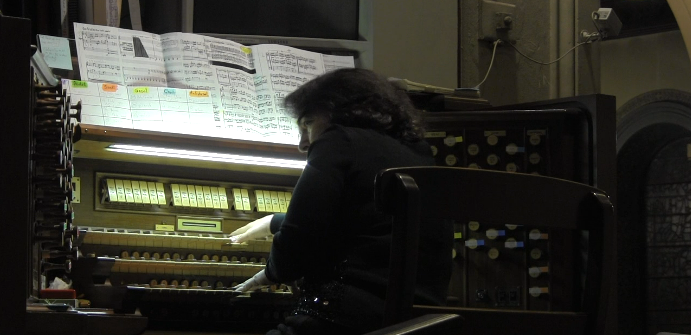In the world of contemporary classical music, Rahilia Hasanova is known as a brilliant and prolific composer with a unique and powerful “voice”. The strength of her music is in bridging the two seemingly disparate worlds of Eastern and Western cultures. By combining the essence of her native (Azerbaijani) culture and traditional music that represents the East with the contemporary classical music traditions of the West, Hasanova creates unparalleled music forms and materials that are as diverse as they are unforgettable. Composer Krzysztof Meyer wrote: “Hasanova’s music is phenomenal; she is a great master.”
Hasanova grew up in one of the post-Soviet republics, Azerbaijan – a country with millennia of rich cultural background and improvisatory music tradition. Hasanova’s music, being deeply rooted in this tradition, strikes an intricate yet natural balance with Western composition techniques. Hasanova acquired these techniques in part through the Shostakovich composition school. As a student of this great school, Hasanova became one of the most progressive composers of her time. She was the first to create ethno-minimalistic compositions in her native country. She was also the first to introduce the aleatoric approach. Musicologist Zumrud Dadashzadeh wrote: “Hasanova’s works are rich in unique intonations that fit into the macrospace of her compositions as self-sufficient microcosms.”
Hasanova’s compositions cover a wide range of music genres and instrumentation from chamber music and symphony compositions to opera and ballet. Musicologist Anna Amrahova wrote: “One of the prominent characteristics of Hasanova’s creations is reaching dramatic register culminations that are expressed through modal-meditative development.”
Hasanova’s music was performed at international festivals and concerts all around the world, including Russia, Ukraine, Belarus, Switzerland, Italy, Belgium, and Austria. In the Netherlands, her music was commissioned twice by the Nieuw Ensemble (‘Sema’a’ in 1994 and ‘Pirebedil’ in 1996.) Her Sema’a was featured on the radio show in Israel and the director of the Israel Contemporary Players, Zmira Lutzki, wrote: “In Sema’a, Hasanova found an ideal realization of form and content. In this piece, everything is circling as in a ritual dance, as in the Universe. I’m a big fan.” Hasanova had solo profile concerts in Azerbaijan, Poland, Germany, the UK, and the US.
In 2009, Hasanova permanently moved to the US to continue to grow her music career and widen the frontiers of her audience. She quickly became actively involved in the organization of concerts and since worked with many performers and ensembles. Her recent commissioned compositions include chamber opera ‘Pendulum Clocks’, ‘Pazyryk’, and ‘Flying over Canyons’ (2014); ‘Plasma Clusters’, ‘Dance of Water’, ‘Yurt’, and ‘Eos-Helios’ (2013); ‘Dance of Fire’, ‘Rainforest’, ‘Zilli’, ‘Khazri-Gilavar’, and ‘Zoom in – Zoom out’ (2012); and ‘Fugues and Postludes’ (2011).
The polyphonic cycle Fugues and Postludes (for solo piano) is a dramatic realization of the composer’s life-long inspiration with the old polyphonic forms and her extraordinary improvisatory talent based on mugam traditions. This cycle is phenomenal in that it organically incorporates traditional elements of Azerbaijani music (scales, rhythmic patterns, and intonations) into the classical forms of Western music. The Fugues and Postludes are multidimensional and each piece carries its own unique emotional character. The cycle was performed at Hasanova’s profile concert at the contemporary music festival ‘Livewire-4’ (UMBC, 2013) and had a great success with the audience. In the words of composer Linda Dusman, “this cycle is fascinating; each detail has a calculated effect; and, the music development is extraordinary growing from a short intonation and filling an entire form.”
Hasanova’s CD recordings include her albums ‘Tetraksis’ (Azerbaijan, 2007) and ‘Dervish’ (Germany, 2005), as well as featured recordings in ‘Kara Karaev’s Circle’ (USA, 2006), ‘Music in Verse’ (the UK, 1996), ‘Fusions’ (Azerbaijan, 1994).
Hasanova’s music is published and distributed by I Resound Press, NEUMA Records & Publications, and
Da Vinci Publishing.
Please, below read the article of David Leone on his Internet magazine Musica Kaleidoscopea:
https://fdleone.com/tag/azerbaijani-composers/

